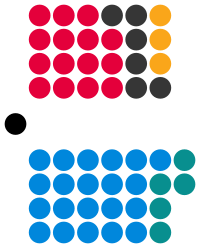House of Commons: Difference between revisions
Jump to navigation
Jump to search
No edit summary |
No edit summary |
||
| Line 69: | Line 69: | ||
==Notes== | ==Notes== | ||
<references group="lower-alpha"/> | <references group="lower-alpha"/> | ||
[[Acts of Parliament]] | |||
Revision as of 15:43, 18 May 2023
The Honourable the Commons of the United Kingdom of Great Britain and Northern Ireland in Parliament assembled | |
|---|---|
| 73rd Parliament | |
 Logo used to represent the House of Commons | |
 Flag of the House of Commons | |
| Type | |
| Type | Lower house of the Parliament of the United Kingdom |
| Leadership | |
JamesAcheson since 21 April 2023 | |
| Structure | |
| Seats | 50 |
 | |
Political groups |
|
Length of term | Up to 2 months |
| Elections | |
Voting system | Webster/Sainte-Laguë |
Last election | 12 May 2023 |
Next election | No later than 23 July 2023 |
The House of Commons is the lower house of Parliament. Like the upper house, the House of Lords, it meets in the Palace of Westminster. The House of Commons is an elected body consisting of 50 members known as Members of Parliament (MPs). In elections, citizens vote for a party, seats are allocated using the Webster/Sainte-Laguë method, and parties appoint people to the seats they've won.
House composition
The Conservative & Unionist Party took government with 20 seats in the May election which a coalition with the Voice Party which gained 5 seats. The Labour Party serve as His Majesty's Most Loyal Opposition with gaining 15 seats in the May election. Four Star Party as well as the Liberal Democrats serve as other opposition within the House of Commons.